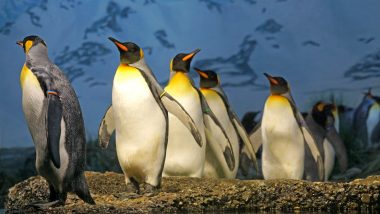Mumbai, January 30: A king penguin and two gentoo penguins have died from the highly pathogenic H5N1 bird flu virus in Antarctica, the first cases of the disease ever reported in the continent. The king penguin was found dead on South Georgia island, a British overseas territory in the Antarctic region, while the gentoo penguins were from South Georgia and the Falkland Islands, about 900 miles (1,500km) west of South Georgia.
According to the Guardian, the bird flu deaths have raised concerns among researchers about the potential impact of the virus on the remote and vulnerable penguin populations, especially during the current breeding season, which could facilitate the transmission of the disease among the colonies. Bird Flu in Antarctica: First-Ever Detection of H5N1 Raises Concerns for Penguins and Other Local Species.
What is H5N1 Strain?
H5N1 is a type of influenza virus that causes severe respiratory disease in birds, commonly known as avian influenza or bird flu. It can also infect mammals, including humans, and has caused several outbreaks in Asia, Africa, Europe and the Americas.
According to the World Health Organization (WHO), H5N1 has killed more than 450 people since 2003, mostly in Asia and Africa. The virus poses a risk to humans who are in close contact with poultry or wild birds or who visit live bird markets. Bird Flu Outbreak: What's the Risk That Spread of H5N1 Avian Influenza in US and Worldwide Could Start a Human Pandemic? Four Key Questions Answered Here.
Why Are Experts Concerned?
Antarctica was the only major geographical region where H5N1 had never been detected before. Birds such as penguins, which have no prior exposure or immunity to the virus, could be more susceptible to infection and mortality.
King penguins are the second-largest penguin species in the world, measuring about 3 feet tall and living for more than 20 years in the wild. They are classified as "least concern" by the International Union for Conservation of Nature (IUCN), but they face threats from climate change, overfishing and pollution.
A study from 2018 predicted that king penguins in Antarctica could face extinction by the end of this century due to the loss of their habitat and food sources as a result of global warming.
The H5N1 virus also claimed the life of a polar bear in Utqiagvik, Alaska, a few weeks ago, marking the first recorded case of this species. Polar bears are categorized as "vulnerable" by the IUCN, mainly because of the shrinking sea ice that affects their hunting and breeding.
Ed Hutchinson, a molecular virologist at the MRC-University of Glasgow Centre for Virus Research, said, "The arrival of this H5N1 virus in the Antarctic towards the end of last year rang alarm bells because of the risk it posed to wildlife in this fragile ecosystem. And while it is very sad to hear reports of penguins dying ... it is unfortunately not at all surprising."
(The above story first appeared on LatestLY on Jan 30, 2024 06:50 PM IST. For more news and updates on politics, world, sports, entertainment and lifestyle, log on to our website latestly.com).













 Quickly
Quickly


